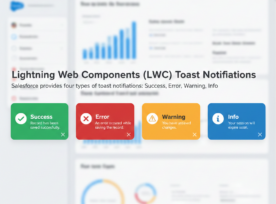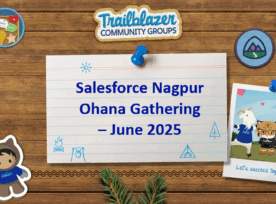Hello Trailblazers! Take a scenario where you are creating a record in Salesforce, and you are not getting any kind of confirmation via notification whether your record is created successfully or it throws any Alert or Warning. So, for this, Salesforce has functionality called “Toast Notifications”. Toast notifications are an effective way to provide users […]
Posts Tagged ‘#perficientnagpur’
One Team, One Breath: Celebrating International Yoga Day at Perficient Nagpur & Pune
The Yogic Way What happens when ancient mindfulness practices meet a modern workplace? You get International Yoga Day at Perficient – a thoughtful pause in the middle of our fast-paced workday, filled with movement, calm, and connection. Yoga, not just a term, not even a physical practice: it’s a celebration of harmony between the mind, […]
My Experience at the Salesforce Nagpur Ohana Gathering – June 2025
Hello Trailblazers! Last week, I had the amazing opportunity to attend the “Salesforce Nagpur Ohana Gathering June 2025.” This Meetup was packed with knowledge-sharing, networking, and inspiration. The event brought together passionate Salesforce professionals and featured insightful sessions from four expert speakers. Each session focused on a crucial aspect of the Salesforce ecosystem—from SOQL optimization to […]
How to Add Product Badges in Optimizely Configured Commerce Spire
This blog is written for developers, merchandisers, or client teams looking to display visual indicators (e.g., “New”, “Sale”, “Non-Returnable”, “Best Seller”) on products within the storefront. In Ecommerce, badges are small visual cues that communicate important product information to customers, such as “New Arrival”, “Sale”, or “Limited Stock”. In Optimizely Configured Commerce (Spire), product badges […]
ES6: Set Vs Array- What and When?
Being a developer and especially a JavaScript developer, we have come across the concept of Arrays more than we can say of. They are the must for storing ordered collections of items and we have various methods to manipulate those collections. But then ES6 came into town and became the hero and introduced us with […]
Remix vs. Next.js: A Comprehensive Look at Modern React Frameworks
In the ever-evolving landscape of web development, choosing the right framework can significantly impact the performance and user experience of your applications. Two of the most prominent frameworks in the React ecosystem today are Remix and Next.js. Both are designed to enhance web development efficiency and performance, but they cater to different needs and use cases. In this […]
Driving Customer Loyalty with Experience Cloud
In today’s competitive business environment, customer loyalty is a valuable asset. Retaining an existing customer is far easier and more cost-effective than acquiring a new one. Loyal customers continue to make purchases and act as advocates for your brand, helping to drive growth and improve your reputation. But how do you create and nurture long-term […]
How to Subscribe to Salesforce Reports
Hello Trailblazers! Salesforce Reports are a cornerstone of effective data-driven decision-making. They allow you to analyze and visualize business data efficiently. Salesforce offers a subscription feature for reports to ensure you or your team stay updated on important metrics without manually checking them. Subscribing ensures that you receive reports regularly in your email inbox, making […]
The Importance of Content Moderation in Salesforce Communities
Content moderation is a key component of online communities, ensuring the platform remains safe, respectful, and professional for all users. While enforcing rules is essential, content moderation is more than just applying penalties or removing harmful posts. It’s about creating an environment that promotes positive interaction, cooperation, and trust among community members. This is especially […]
How to Subscribe to Salesforce Dashboards?
Hello Trailblazers! Salesforce Dashboards are powerful tools that allow users to visualize and analyze data at a glance. To stay updated on key metrics without manually checking dashboards, Salesforce provides a subscription feature. Subscribing to dashboards ensures that you and your team receive timely updates via email, helping you stay informed and make data-driven decisions. […]
How to Create a Bucket Column for the Picklist Type Field in Salesforce Report
Hello Trailblazers! Salesforce provides powerful reporting tools to analyze and visualize data effectively. Among these tools, the Bucket Field stands out as a feature that enables categorization of data directly within reports. In this blog post, we’ll focus on creating a Bucket Column specifically for Picklist type fields in Salesforce Reports, offering a step-by-step guide […]
Maximizing ROI with Experience Cloud: Best Practices for Analytics and Reporting
In today’s digital world, businesses are increasingly turning to Experience Cloud to create personalized, engaging experiences for their customers. But launching an Experience Cloud platform is just the first step. To ensure you’re getting the most value out of it, you need to be able to measure its performance. That’s where analytics and reporting come […]











